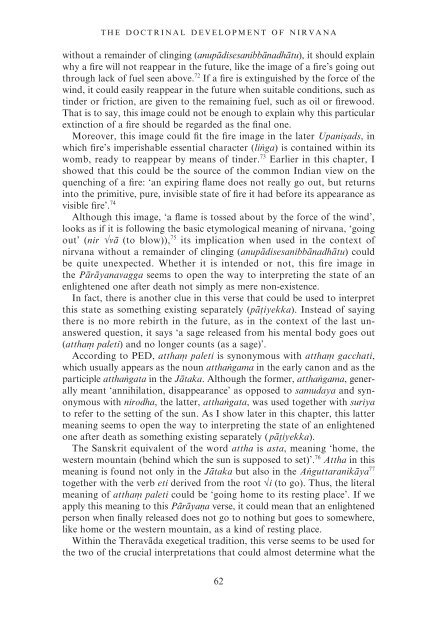Metaphor and Literalism in Buddhism: The ... - misterdanger.net
Metaphor and Literalism in Buddhism: The ... - misterdanger.net
Metaphor and Literalism in Buddhism: The ... - misterdanger.net
You also want an ePaper? Increase the reach of your titles
YUMPU automatically turns print PDFs into web optimized ePapers that Google loves.
THE DOCTRINAL DEVELOPMENT OF NIRVANA<br />
without a rema<strong>in</strong>der of cl<strong>in</strong>g<strong>in</strong>g (anupAdisesanibbAnadhAtu), it should expla<strong>in</strong><br />
why a fire will not reappear <strong>in</strong> the future, like the image of a fire’s go<strong>in</strong>g out<br />
through lack of fuel seen above. 72 If a fire is ext<strong>in</strong>guished by the force of the<br />
w<strong>in</strong>d, it could easily reappear <strong>in</strong> the future when suitable conditions, such as<br />
t<strong>in</strong>der or friction, are given to the rema<strong>in</strong><strong>in</strong>g fuel, such as oil or firewood.<br />
That is to say, this image could not be enough to expla<strong>in</strong> why this particular<br />
ext<strong>in</strong>ction of a fire should be regarded as the f<strong>in</strong>al one.<br />
Moreover, this image could fit the fire image <strong>in</strong> the later UpaniLads, <strong>in</strong><br />
which fire’s imperishable essential character (liWga) is conta<strong>in</strong>ed with<strong>in</strong> its<br />
womb, ready to reappear by means of t<strong>in</strong>der. 73 Earlier <strong>in</strong> this chapter, I<br />
showed that this could be the source of the common Indian view on the<br />
quench<strong>in</strong>g of a fire: ‘an expir<strong>in</strong>g flame does not really go out, but returns<br />
<strong>in</strong>to the primitive, pure, <strong>in</strong>visible state of fire it had before its appearance as<br />
visible fire’. 74<br />
Although this image, ‘a flame is tossed about by the force of the w<strong>in</strong>d’,<br />
looks as if it is follow<strong>in</strong>g the basic etymological mean<strong>in</strong>g of nirvana, ‘go<strong>in</strong>g<br />
out’ (nir √vA (to blow)), 75 its implication when used <strong>in</strong> the context of<br />
nirvana without a rema<strong>in</strong>der of cl<strong>in</strong>g<strong>in</strong>g (anupAdisesanibbAnadhAtu) could<br />
be quite unexpected. Whether it is <strong>in</strong>tended or not, this fire image <strong>in</strong><br />
the PArAyanavagga seems to open the way to <strong>in</strong>terpret<strong>in</strong>g the state of an<br />
enlightened one after death not simply as mere non-existence.<br />
In fact, there is another clue <strong>in</strong> this verse that could be used to <strong>in</strong>terpret<br />
this state as someth<strong>in</strong>g exist<strong>in</strong>g separately (pAMiyekka). Instead of say<strong>in</strong>g<br />
there is no more rebirth <strong>in</strong> the future, as <strong>in</strong> the context of the last unanswered<br />
question, it says ‘a sage released from his mental body goes out<br />
(atthaN paleti) <strong>and</strong> no longer counts (as a sage)’.<br />
Accord<strong>in</strong>g to PED, atthaN paleti is synonymous with atthaN gacchati,<br />
which usually appears as the noun atthaWgama <strong>in</strong> the early canon <strong>and</strong> as the<br />
participle atthaWgata <strong>in</strong> the JAtaka. Although the former, atthaWgama, generally<br />
meant ‘annihilation, disappearance’ as opposed to samudaya <strong>and</strong> synonymous<br />
with nirodha, the latter, atthaWgata, was used together with suriya<br />
to refer to the sett<strong>in</strong>g of the sun. As I show later <strong>in</strong> this chapter, this latter<br />
mean<strong>in</strong>g seems to open the way to <strong>in</strong>terpret<strong>in</strong>g the state of an enlightened<br />
one after death as someth<strong>in</strong>g exist<strong>in</strong>g separately (pAMiyekka).<br />
<strong>The</strong> Sanskrit equivalent of the word attha is asta, mean<strong>in</strong>g ‘home, the<br />
western mounta<strong>in</strong> (beh<strong>in</strong>d which the sun is supposed to set)’. 76 Attha <strong>in</strong> this<br />
mean<strong>in</strong>g is found not only <strong>in</strong> the JAtaka but also <strong>in</strong> the AWguttaranikAya 77<br />
together with the verb eti derived from the root √i (to go). Thus, the literal<br />
mean<strong>in</strong>g of atthaN paleti could be ‘go<strong>in</strong>g home to its rest<strong>in</strong>g place’. If we<br />
apply this mean<strong>in</strong>g to this PArAyaOa verse, it could mean that an enlightened<br />
person when f<strong>in</strong>ally released does not go to noth<strong>in</strong>g but goes to somewhere,<br />
like home or the western mounta<strong>in</strong>, as a k<strong>in</strong>d of rest<strong>in</strong>g place.<br />
With<strong>in</strong> the <strong>The</strong>ravada exegetical tradition, this verse seems to be used for<br />
the two of the crucial <strong>in</strong>terpretations that could almost determ<strong>in</strong>e what the<br />
62











